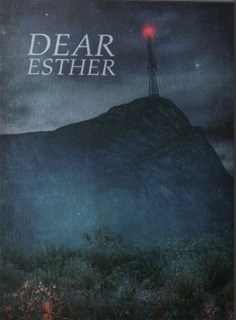Nothing more than a navigable screensaver.
Dear Esther certainly didn't make it worth my while, which requires a serious effort considering the "while" is only an hour long. You pay eight bucks for a short stroll through a pretty island and, well, that's it. Since the game does away with traditional gameplay, there's no challenge or tension, no objectives to complete or actions to perform other than holding down the Move Forward-key until you reach the credits. This means that Dear Esther abolishes a crucial part of a game's experience: a feeling of purpose. Your role is never defined so it doesn't matter whether you're there or not. Which is to say that it doesn't matter whether you play or not.
Unless you want to indulge in the story, but even then you might end up feeling cheated. It involves a certain Esther who was seemingly killed in a car accident and is mourned via narrated letters and more car metaphors than you can shake a stick at, though additional character call-outs, theme references and visual clues show that there could be more to it than that. It's a draw-your-own-conclusion kind of ordeal, especially since the ostentatious writing and chopped up disposition that's randomly delivered means that one playthrough doesn't suffice to make much sense of it all. It's an invitation to waste another hour going through the same motions for more story bits, but it's not an invitation I'm inclined to accept.
The only true hook Dear Esther has is the scenery. For a love labour made entirely with Valve's Source engine, it's in impressive-looking and -sounding package that contains some of the most striking vistas I've seen the development kit produce. You'll get plenty of time to ogle the pretty sights too as you trudge across the island's long stretches. Despite the many forks in the road there's only one path to continue onward, all other paths end with an inkling of the game's major themes of illness, loss and regret, but the subsequent lengthy and uneventful backtracking will soon excise any desire to explore.
The minimalistic sound design is great fit for the isolated feeling. The wind rustling through the grass and the water graciously meeting the shores make for a relaxing soundscape, there's a handful of songs comprised of strikers and piano to form an eerie, almost unearthly soundtrack and the voice acting is good enough to get the job done though I found the voice itself to be unfit for the mood.
Dear Esther's biggest draw is also its biggest undoing: other games do ambient settings really well too but don't rely on them to sell the package, and the whole comes across as an art student putting his portfolio on sale. There is exactly one moment where I thought things started getting interesting, and that moment was gone as soon as it started. Dear Esther isn't tense or chilling. Instead it's a pretentious slack with hackneyed narration. A car crash, if you will: you'll be drawn to look at it, but you do not want to experience it. It might cost you dearly.

